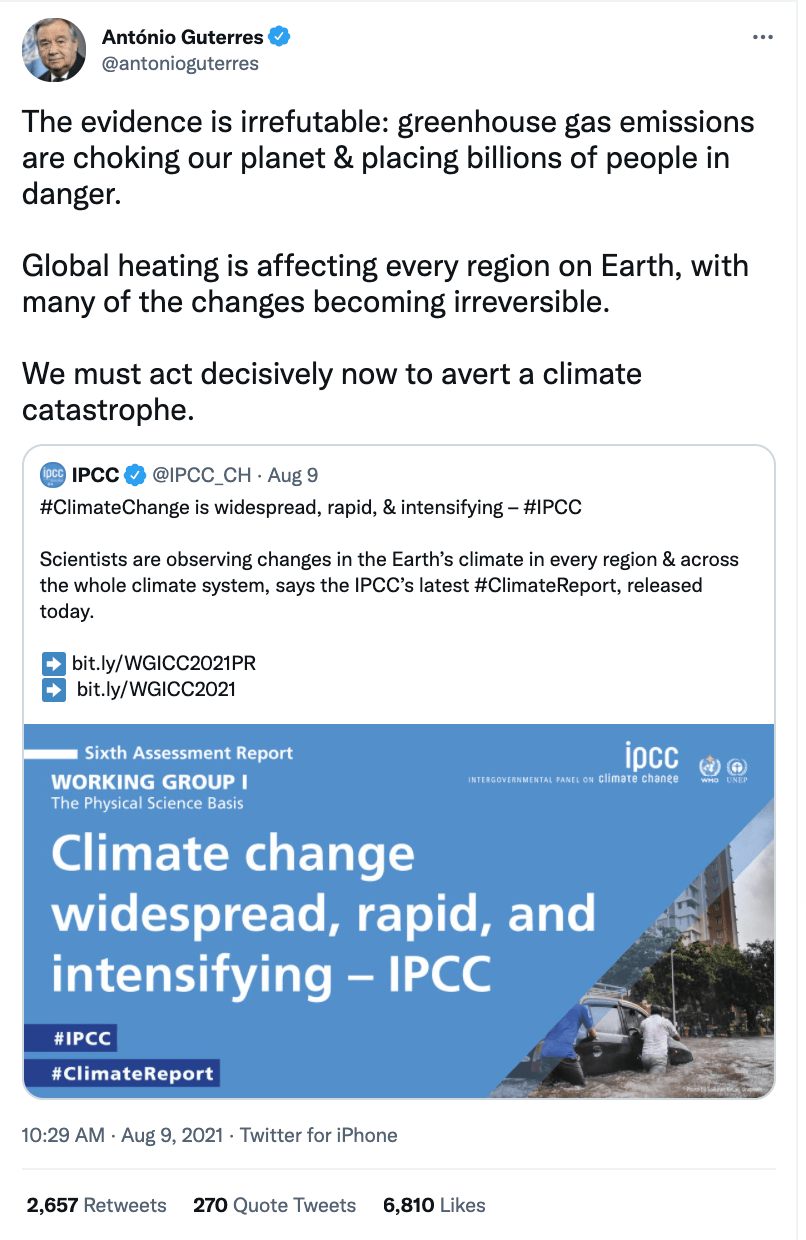While human-induced climate change has been affecting many weather and climate extremes across the globe for years, scientists continue to observe new worrisome changes across the Earth’s climate system: in the atmosphere, oceans, ice floes, and on land. According to the latest INTERGOVERNMENTAL PANEL ON CLIMATE CHANGE (IPCC) report, climate change is widespread, rapid, and intensifying, and some trends are now considered irreversible for centuries to millennia ahead.
The IPCC Working Group I report, Climate Change 2021: the Physical Science Basis, was released on August 9, 2021, following its approval by 195 IPCC member governments. The report’s thirteen chapters provide an assessment of the current evidence on the physical science of climate change, knowledge evaluation gained from observations, reanalyses, paleoclimate archives, and climate model simulations, as well as physical, chemical, and biological climate processes. The Working Group I report is the first installment of the IPCC’s Sixth Assessment Report (AR6), which will be completed in 2022. “This report reflects extraordinary efforts under exceptional circumstances,” said Hoesung Lee, the IPCC Chair. “The innovations in this report, and advances in climate science that it reflects, provide an invaluable input into climate negotiations and decision-making.”
The report prepared by 234 scientists from 66 countries stresses that many of the changes observed in the climate are unprecedented in thousands, if not hundreds of thousands of years, and emphasizes that some of the changes, such as continued sea-level rise, are irreversible over hundreds to thousands of years. The IPCC experts project that in the coming decades, climate change will intensify across all regions, bringing more heatwaves, longer warm seasons, and shorter cold seasons.
The report provides new estimates of the chances of crossing the global warming level of 1.5°C in the next decades and finds that unless there are immediate, large-scale reductions in greenhouse gas emissions, limiting warming to 1.5°C or even 2°C will be beyond reach.
“This report is a reality check,” said IPCC Working Group I Co-Chair Valérie Masson-Delmotte. “We now have a much clearer picture of the past, present and future climate, which is essential for understanding where we are headed, what can be done, and how we can prepare.”

In his official statement, the UN Secretary-General, António Guterres called the IPCC Working Group I report “a code red for humanity,” saying that the “greenhouse gas emissions from fossil fuel burning and deforestation are choking our planet and putting billions of people at immediate risk.” He noted that the internationally agreed threshold of 1.5 degrees above pre-industrial levels of global heating was perilously close. “We are at imminent risk of hitting 1.5 degrees in the near term. The only way to prevent exceeding this threshold is by urgently stepping up our efforts, and pursuing the most ambitious path. We must act decisively now to keep 1.5 alive,” he urged.Guterres emphasized that the viability of our societies depends on the government, business, and civil society leaders uniting behind policies, investments, and actions. “The solutions are clear. Inclusive and green economies, prosperity, cleaner air and better health are possible for all if we respond to this crisis with solidarity and courage,” he stressed. He also urged the G20 and other major emitters to join the net-zero emissions coalition and reinforce their commitments with credible, concrete and enhanced Nationally Determined Contributions and policies before COP26 in Glasgow. “If we combine forces now, we can avert climate catastrophe. But, as today’s report makes clear, there is no time for delay and no room for excuses. I count on government leaders and all stakeholders to ensure COP26 is a success,” he said concluding his statement.
Despite the obviously alarming situation, the authors of the report say that rapid, strong, and sustained reductions in emissions of carbon dioxide and other greenhouse gases would significantly limit climate change. The benefits for air quality would be seen almost immediately, while for the global temperatures to stabilize, we would need to wait as long as 20 to 30 years.
The Intergovernmental Panel on Climate Change (IPCC) is the UN body that assesses the science related to climate change. It was established by the UN Environment Programme (UNEP) and the World Meteorological Organization (WMO) in 1988 to provide political leaders with periodic scientific assessments concerning climate change, its implications, and risks, as well as to put forward adaptation and mitigation strategies. In the same year, the UN General Assembly endorsed the action by the WMO and UNEP in jointly establishing the IPCC, which has 195 member states.
Thousands of people from all over the world contribute to the work of the IPCC. For the assessment reports, IPCC scientists volunteer to assess thousands of scientific papers published each year to provide a comprehensive summary of what is known about climate change, its drivers, impact, future risks, and possible adaptation and mitigation actions and strategies that could reduce climate change. IPCC reports are drafted and reviewed in several stages, thus guaranteeing objectivity and transparency.
Digital for Planet - D4P © 2025 | All rights reserved